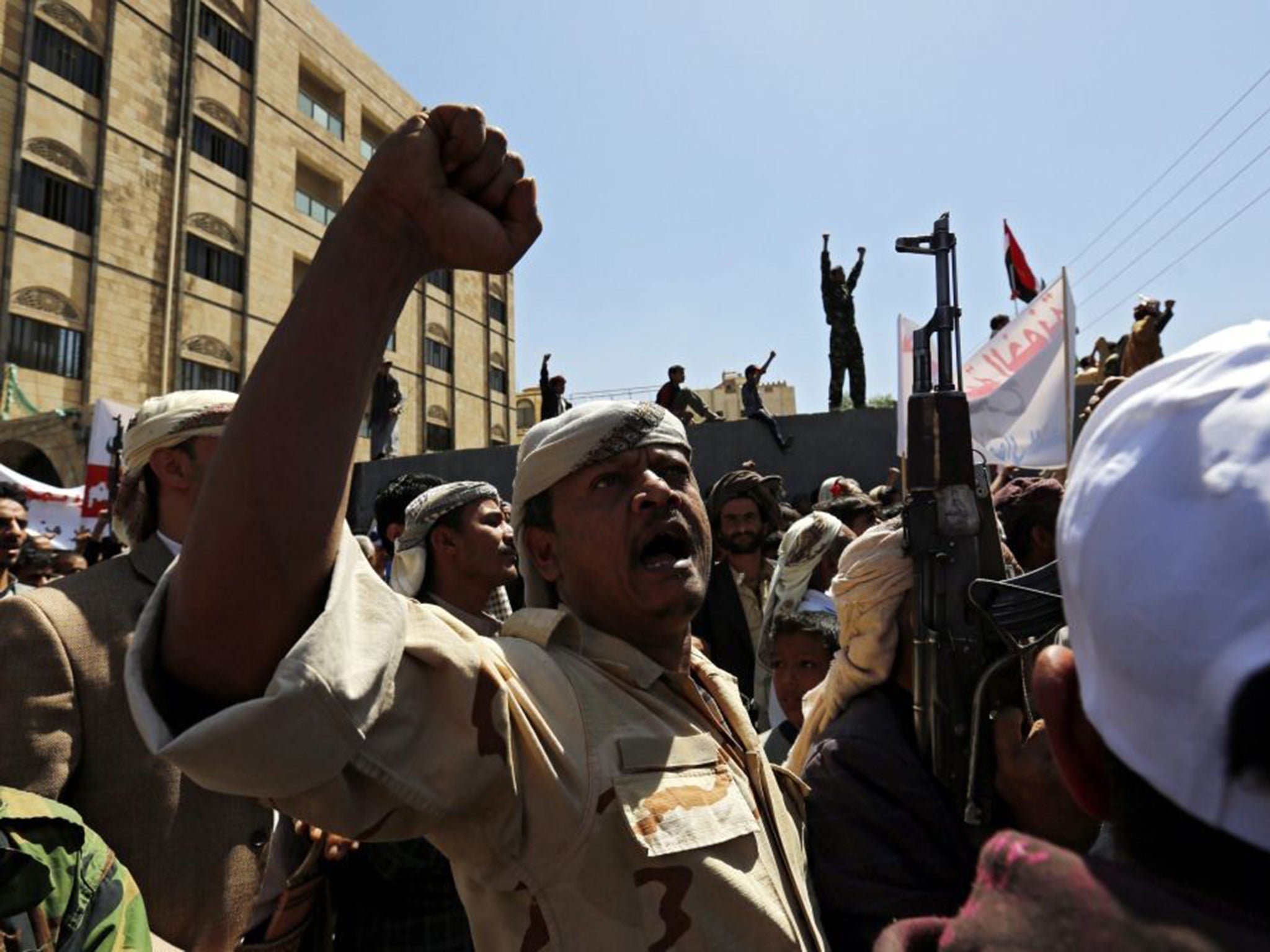Britain and US pile pressure on Saudi Arabia over Yemen funeral bombing
White House says allegiance to its Middle East ally is ‘not a blank cheque’, while the UK warns it is ‘continually reviewing’ Saudi arms export licences

The British and American governments have vowed to apply increased diplomatic pressure to their ally Saudi Arabia following the bombing of a packed funeral hall in the Yemeni capital of Sana’a on Saturday.
The attack, strongly believed to have been carried out by the Saudi-led coalition air force, killed more than 140 people and injured as many as 600 more, in one of the deadliest massacres of the country’s civil war.
The US said in the wake of the bombing that its support for Saudi Arabia on security issues was not a “blank cheque”, while the UK warned its decision to allow controversial arms exports to Riyadh was “under careful and continual review”.
The air strikes sparked a furious reaction in Yemen on Sunday, with thousands of demonstrators – some armed with automatic weapons – marching on the UN headquarters in southern Sana’a, demanding an independent investigation.
Though it controls the only air forces in the region, Saudi Arabia has not officially acknowledged responsibility for the attack, which targeted the funeral of the father of Galal al-Rawishan, the interior minister of the Houthi rebel-led government.
Yemeni officials said the dead and wounded included senior military and security officials from the Houthi ranks, and Mohammed Abdul-Salam, the Houthi spokesman in Sana’a, described the bombing as an act of “genocide” by the Saudi-led coalition.
The Saudi military said in a statement that it would launch an investigation into “reports about the regrettable and painful bombing”, while insisting its troops “have clear instructions not to target populated area and to avoid civilians”. Previous Saudi investigations have blamed Houthi loyalists for gathering near the sites of its attacks.
Britain is among Saudi Arabia’s foremost international allies and, despite ever mounting concerns among relief groups, continues to support its bombing campaign against the Houthis with arms exports and military training.
Foreign Office minister Tobias Ellwood phoned the Saudi ambassador to London on Sunday afternoon, raising concerns over the bombing and calling for an investigation “take place as a matter of urgency”.
“I am deeply concerned by reports of an air strike hitting a funeral hall in the Yemeni capital Sana’a yesterday,” he said in a statement. “The scenes from the site are shocking.
“There can be no military solution to this conflict. We urge all sides to recommit to political talks and to implement a cessation of hostilities.”
On the point of UK arms sales to Saudi Arabia, a Government spokesperson told The Independent the UK “takes its arms export responsibilities very seriously”.
“The key test ... for our continued licensing of arms exports to Saudi Arabia is whether there is a clear risk that those exports might be used in the commission of a serious violation of international humanitarian law,” she said. “The situation is kept under careful and continual review.”
The US said it had launched an "immediate review" of its already reduced support for the Saudi-led coalition, saying it was “prepared to adjust our support so as to better align with US principles, values and interests”.
Ned Price, spokesman for the White House National Security Council, said: “US security cooperation with Saudi Arabia is not a blank cheque.”
Earlier on Sunday, the UN Secretary-General Ban Ki-moon condemned the bombing and said that “any deliberate attack against civilians is utterly unacceptable”, adding those responsible “must be brought to justice”.
And the UN humanitarian coordinator in Yemen, Jamie McGoldrick, said in a statement that the relief community in the country was “shocked and outraged” by the air strikes. He condemned the “horrific attack” and reminded all parties “that under international humanitarian law, they are obliged to protect civilians and civilian infrastructures”.
The final death toll for Saturday’s attack remains unclear, such was the chaos at the site of what was once the grand hall of ceremonies on al-Khamseen Street.
Multiple strikes sent hundreds of body parts flying through the hall and into the street outside, with rescuers later collecting them up in sacks. The attack left the building little more than a shell, with most of its walls and roof gone.
“The place has been turned into a lake of blood,” said one rescuer, Murad Tawfiq.
The International Committee of the Red Cross (ICRC) said it had prepared 300 body bags, while the rebel-controlled Health Ministry gave a lower figure, saying 115 bodies had been counted so far. The casualty toll of more than 140 was given by a UN official, who estimated 525 had been wounded.
It may yet be the deadliest single attack of the Saudi-led campaign, after a July 2015 bombing near a power plant in Mokha that killed at least 120 people.
Saudi Arabia reiterated in its latest statement that its coalition was “supporting the legitimate government in Yemen”, that of President Abd Rabbu Mansour Hadi, who was ousted at the start of 2015 by Shia Houthi rebels loyal to the former president Ali Abdullah Saleh.
A recent report found that coalition air strikes were responsible for some 60 per cent of civilian casualties in Yemen’s war, amounting to almost 3,800 deaths since they began in March last year. The UN estimates that the conflict as a whole has seen at least 9,000 people killed and nearly three million people forced to flee their homes, making for one of the worst humanitarian crises in the world.
Join our commenting forum
Join thought-provoking conversations, follow other Independent readers and see their replies
Comments
Bookmark popover
Removed from bookmarks